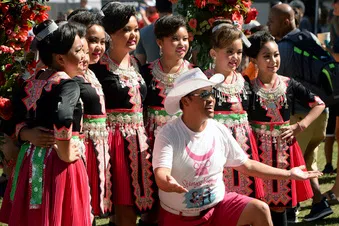BOGOTA, Colombia (AP) — Colombian authorities on Wednesday were investigating the alleged kidnapping and murder of a Hmong American comedian and activist who was found dead Monday in a wooded area of the northern city Medellín.
Prosecutors said Tou Ger Xiong, 50, arrived in Medellín on Nov. 29. He went to meet a friend in the city on Dec. 10. Hours later he called a friend in the United States to tell him that he was kidnapped and his captors demanded a $2,000 ransom to free him, according to prosecutors.
Yiri Amado Sánchez, sectional director of Medellín prosecutor’s office, indicated that another friend of the activist reported the kidnapping for ransom — a common occurrence in the city. The office did not identify the friend by name.
“The man was the victim of a kidnapping,” Sánchez said, adding that the alleged kidnappers didn’t collect the money.
Xiong, who lived in the St. Paul, Minnesota, suburb of Woodbury, was a comedian, entertainer, storyteller and social justice activist. He talked about his Hmong heritage and immigrant experience to forge connections with audiences across the country. His family said in a statement issued by his brother, Eh Xiong, that “the pain of his loss is indescribable.”
The family said Tou Ger Xiong, one of 11 siblings, “dedicated his life to building bridges across cultures, to giving voice for those who may not have one, and to working toward justice for all.”
So far this year, Colombian prosecutors have documented kidnappings of 253 people for attempted extortion.
Three American tourists, including Xiong, have been murdered in Colombia just in the last month.
Eh Xiong said his brother frequently traveled to Colombia. He said he last heard from his brother Sunday night when he asked him to send $2,000. His brother said he was “in a bit of a situation here” but didn’t give details.
The brother said that he was working to bring his brother’s body back to Minnesota.
The State Department press office said it was providing “all appropriate assistance” to the family but declined to provide further details out of respect to the family.
Tou Ger Xiong was born in Laos in 1973. His family fled to Thailand after the communist takeover in 1975 because his father had served as captain in the U.S-backed Hmong army. They spent four years in a refugee camp in Thailand before resettling in St. Paul, which is home to the largest Hmong community of any city in the U.S.
He was the valedictorian of the class of 1992 at Humboldt High School and earned a bachelor’s degree in political science from Carleton College, a prestigious liberal arts school in Northfield. He helped establish the annual “Hmong Minnesota Day” at the Minnesota State Fair in 2015 to commemorate the 40th anniversary of the first arrival of Hmong refugees in the state, where the community now numbers around 95,000, according to U.S. Census Department data.
St. Paul Mayor Melvin Carter paid tribute to Xiong Wednesday, saying he was “too full of life to be snatched away so suddenly.”
“He was one of the funniest and most sincere people I’ve ever met.” Carter said. “A community leader, accomplished storyteller & comedian, the first Hmong rapper, and an absolute karaoke master in any genre of music. His light enlivened everyone around him. … If you ever saw a guy dancing at one of my campaign events wearing a James Brown (or Elvis) costume & a permanent laugh, you’ve met Tou Ger.”
Former Minnesota state Sen. Mee Moua, a family friend and the first Hmong American woman elected to any state legislature in the U.S., said Xiong helped Hmong Americans see themselves as “gifted, creative and amazing beings” and built bridges to other communities.
“Today the Hmong diaspora around the world, whether in Laos, Thailand, Vietnam, China, France, Australia, Canada, South America, and the United States of America, have lost a one of a kind modern day hero,” Moua said in a statement Tuesday. “Tou: In a time when we needed belonging, your stories anchored our Hmong children in their roots. Your songs and your dance invited elders to embrace the new without fear of losing their cultural identity.”
His family said they planned to create a nonprofit foundation in his name as a tribute to his legacy.




